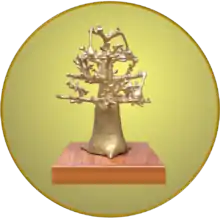Ahmed Abdel Muti Hijazi (Arabic: أحمد عبد المعطي حجازي) (born in 1935 in Al-Menoufiya, Egypt) is an Egyptian contemporary poet.
Contributed to many literary conferences in many Arab capitals, and is one of the pioneers of the movement of renewal in contemporary Arabic poetry.
Education
Bachelor of Arts, Department of Sociology at the University of Sorbonne, France, in 1979.
Positions held
He was the managing editor of Rose al-Yūsuf magazine. In France he worked as a professor of Arabic poetry at the Paris 8 University and the new Sorbonne University. He returned to Cairo and worked for Al-Ahram newspaper. He served as editor-in-chief of Ibdaa magazine from 1990 to 2002 when he resigned from the post.[1] He was reappointed editor-in-chief of the magazine in 2006.[1]
Poetry works
- City Without A Heart, 1959.
- Uras, 1959.
- Nothing Remains but Confession, 1965
- Elegy of the Beautiful life, 1972
- Creatures of the Kingdom of the Night, 1978.
- Cement Trees, 1989.
- Ruins of Time, 2011.
- Me and the city, 1957.
Writings
- Muhammad and those
- Ibrahim Nagi
- Khalil Mutran
- An interview Tuesday
- My poetry
- Other cities
- Arabism of Egypt
- Ahmed Shawqi grandchildren
Awards
- Was awarded the 1989 Egyptian-Greek Cavafy
- Egyptian State incentive prize in literature of the Supreme Council of Culture, 1997
- African Poetry Prize, 1996
See also
References
- 1 2 Robier Al Faris (22 April 2007). "When a father kills his baby". Arab West Report. Retrieved 29 September 2013.
This article is issued from Wikipedia. The text is licensed under Creative Commons - Attribution - Sharealike. Additional terms may apply for the media files.
